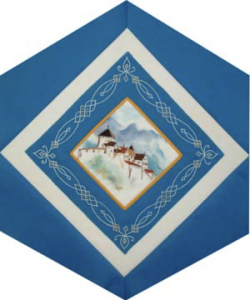Liechtenstein

The Block
An embroidered rendition of Liechtenstein’s Schloss Vaduz (Vaduz Castle) stitched by Ruth Lewis stands framed against a silhouette of hand-painted mountains. Situated on an outcrop of rock overlooking the tiny town of Vaduz, this 13th century castle which is still home to the current prince and his family, is arguably the most impressive feature of Liechtenstein. The needlework pattern, which creates a striking frame around the scene, is typical of the folk-art designs found throughout the nation on buildings and wood furniture, as well as around door and window frames.
Cultural Profile
Liechtenstein is a landlocked country in Europe completely surrounded by other landlocked countries. It has a total area of only 160 square kilometres, making it the fourth smallest nation on the continent. Millions of years ago the region was covered by sea, as evidenced by the fossilized shells, fish teeth, shellfish, reef limestone, and sea urchins that were cast up by prehistoric volcanic eruptions. The country, nestled in the Rhine Valley, is the last feudal remnant of the Holy Roman Empire and traces its origins back to Hugo von Liechtenstein, younger son of Mannegold the Second. Although it is a popular skiing destination, Liechtenstein is known for its mild climate, a result of the föhn (warm, dry winds blowing down the valleys of the Alps). Stamps were at one time the main source of income in this predominantly agricultural country. However, since the 1960s the nation has become more industrialized and is currently home to light industries such as textiles, metal goods, precision instruments, pharmaceuticals and ceramics. It is also a centre for financial services. German is the official language, with an Alemannic dialect commonly spoken. Due to the country’s small size, half of its workforce actually daily commute to work in neighboring Austria and Switzerland. Although Liechtenstein does not have a particularly strong tradition in the arts, the country is known for its pottery, sculpture, woodcarving and leatherwork. Its citizens love their brass bands and choirs and still produce highly decorative postage stamps. The number of Liechtensteiners who have immigrated to Canada remains small and significant communities here have yet to be established.
Sponsor: In memoriam John and Linda Jekel, from their family
